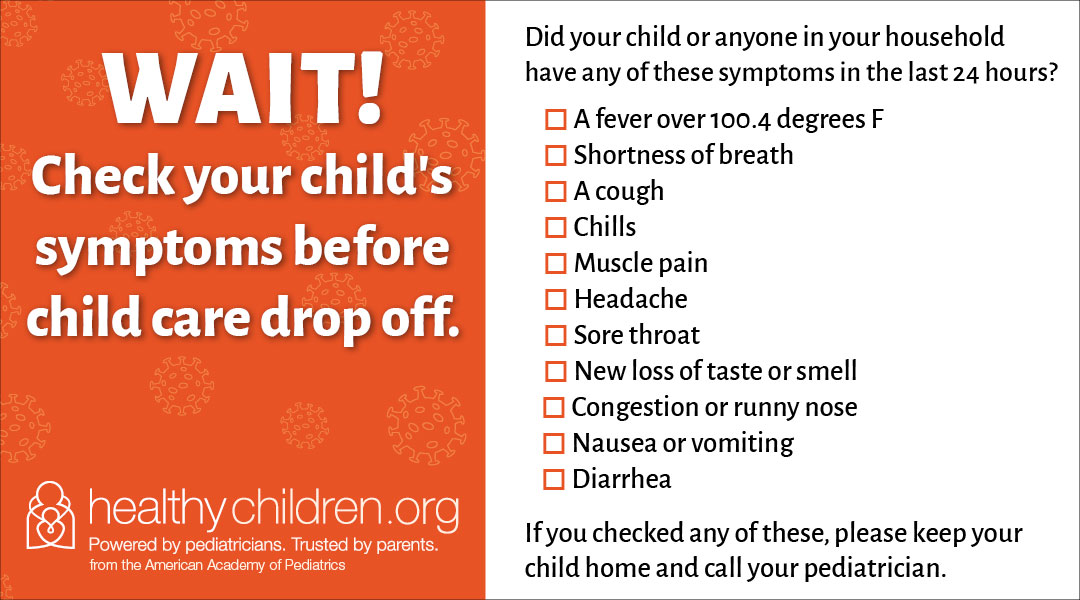It depends on where you live, the health of your child and other family members, and the steps your child care facility or provider takes to help prevent the spread of
COVID-19. The American Academy of Pediatrics
advises child care centers to work with local and state health departments to help keep children and staff as safe as possible.
Check in with your pediatrician
Don't hesitate to talk with your pediatrician about child care options during the COVID-19 pandemic. This can help you decide what is best for your situation, based on your child's medical history, your family circumstances, if immunizations are up to date and by checking that growth and development are on track. All to make sure your child is in good overall
health.
Pediatricians are providing many different ways to
stay connected during the pandemic and have made changes to keep families as safe as possible during appointments.
Your pediatrician can also talk about the impact of the pandemic on your local community. They can keep you updated on local and state health department recommendations the risks and benefits of in-person
school and other activities, as well.
Check in with your child care provider
You'll want to be comfortable with how the center plans to clean and disinfect, screen children and staff for symptoms, and handle illness:
Research suggests that child care centers do not fuel the spread of COVID-19 in communities when they take proper safety steps. Check with your child care center to ask about:
Cleaning and disinfecting procedures. Are they following
CDC recommendations for keeping surfaces free of germs? This includes cleaning and removing disinfectant from toys before infants and toddlers play with them.
Daily health checks and screening. Before coming into the center each day, will children and staff have their
temperature taken to make sure they do not have a fever (100.4 degrees Fahrenheit or higher) or other
symptoms of illness?
Testing and isolation. If someone gets sick, will they need to get
tested for COVID-19? If someone tests positive, how long should they stay home from child care? If a child starts feeling ill during the day, is an isolation room set aside with proper supervision until they can go home? What is the policy for children and staff returning to the facility after they get better?
Visitors. Do consultants such as speech or physical therapists who work with children at the center use virtual options whenever possible? If mothers are allowed in to breastfeed their babies, are there separate, well-ventilated spaces available where staff who can bring the infant to the mother there and then carry the infant back to the group?

Routines
You'll also want to make sure the center has a plan for keeping your child safe during daily routines. This includes:
Personal & group contact. Who will have contact with your child? Will there be fewer children in each group? Will groups move through the program day without mingling with other children and staff? Will outdoor and office areas be used to help increase space for each child and to keep groups separate?
Protective gear. Will staff be required to wear
cloth face coverings and encourage children age 2 and older to wear cloth face coverings? Will staff have access to multiple smocks, gloves, and other protective gear throughout the day?
Time outside. Do groups regularly spend time outdoors to help reduce the spread of the virus? Is outdoor play equipment properly cleaned between each classroom's use? Do classrooms practice handwashing before and after outdoor play?
Meals, snacks, and naps. Will the center keep children
physically distanced during meals, snacks, and naps? Note that if children stay with the same small group all day, it may not be necessary to keep them 6 feet apart when eating. Infants should still be held when being fed and staff should always avoid bottle propping. When children nap, their cots can be placed head to foot, and they should not wear masks.
Drop-off & pick-up. Are arrival and drop-off times staggered to help avoid contact between groups of staff and children? Are arrivals and drop-offs done outside the facility?
What about family child care?
Family child care has played an important role during the COVID-19 pandemic as many families looked to providers who could care for their children in smaller, home settings. Ask your family-based provider if other household members come in contact with your child while they are there. The AAP recommends keeping the child care space separate from the rest of the household. This way, the provider can clean and disinfect the area where your child spends their time and avoid contact with family members.
Remember
When it comes to the best child care options during the COVID-19 pandemic, there is not one right answer for every family. Talk about any concerns with your pediatrician and child care facility or provider. This can help you find the right balance and keep your family as safe as possible.
More Information